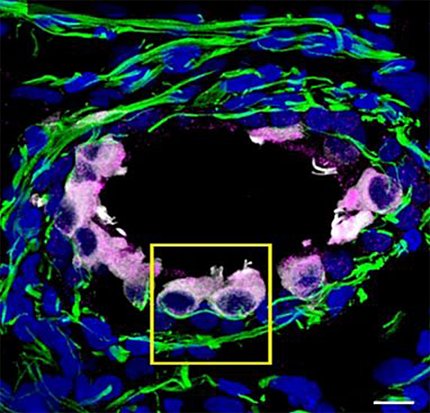SARS-CoV-2 Can Infect Inner Ear Cells

Photo: Jeong et al, Communications Medicine
A commonly reported symptom of Covid-19 infection has been loss of taste and smell. NIAID-funded researchers have found another sensory connection: SARS-CoV-2 can infect inner ear cells, which could explain the hearing and balance issues reported by some Covid-19 patients. The findings appeared in Communications Medicine.
Hearing and balance symptoms often result from viral infections in the inner ear. But the effects of SARS-CoV-2 on the ear remain poorly understood.
The researchers identified 10 patients with Covid-19 who developed hearing loss after infection; 9 of them also experienced tinnitus, and 6 patients experienced vertigo. The timing of symptom onset suggested a correlation between Covid-19 infection and hearing loss.
The team collected inner ear tissue from patients who’d had surgery to treat severe vertigo. None of these donors had Covid-19.
Infection by SARS-CoV-2 requires certain proteins on the host cell surface. The researchers found these proteins on two types of inner ear cells—hair cells and Schwann cells. SARS-CoV-2 could infect both cell types in the lab.
Human inner ear tissue is difficult for researchers to obtain so the team developed models of inner ear tissue they could use for further investigation. First, they reprogrammed cells from human skin to become stem cells. They then directed the stem cells to develop into precursors of either hair cells or Schwann cells.
Like the human inner ear samples, these cells had the proteins needed for SARS-CoV-2 infection. SARS-CoV-2 infected the hair cell precursors and, to a lesser extent, the Schwann cells.
The team also generated 3D inner ear tissues, called organoids, from stem cells. These mimic the types of cells in the inner ear, and their spatial organization and function. The virus was able to infect the hair cell-like cells in the organoids.
Together, these results point to SARS-CoV-2 infection of the inner ear as a cause of Covid-19-associated hearing and balance issues. The work also opens a path for studying other viruses that affect hearing.—Brian Doctrow, NIH Research Matters
